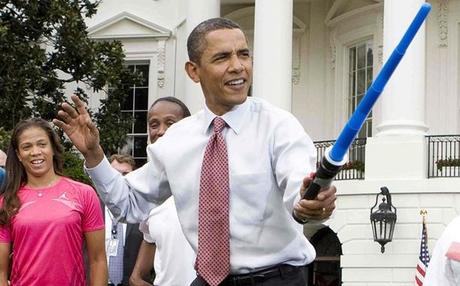
Source: The Atlantic Wire
If hippies were in full bloom by 1967 and punks at their loudest in 1976 then 2012 is the year geeks came out of comic book stores and into the streets.
The two biggest films of the year, The Avengers and The Dark Knight Rises, are based on superheroes while locally Channel 9 is so confident of the nerdy appeal of The Big Bang Theory, it screens the show seven days a week.
Unlike the saxophone cool of his Democratic predecessor Bill Clinton, Barack Obama prefers to wield a toy lightsabre during photo opportunities. “Be careful” bullies are warned,” that computer nerd you wedgie today will probably be your boss tomorrow”.
But this success, like Peter Parker’s transformation from a weedy teenager to heroic Spider-man, comes at a price.
Like all groups that briefly capture the zeitgeist, geeks have been earmarked by global capitalism to be transformed from a vibrant subculture to a marketing demographic.
One of capitalism’s strengths is its omnivorous appetite for new markets. As long as they have money to spend, nobody is denied the chance to be focussed-grouped, specifically advertised at and eventually persuaded a particular pair of jeans will give them freedom.
No subsection of society is immune to this inevitable process. 1960s radicals may have wanted to overthrow the military-industrial complex but its members couldn’t stop Che Guevara becoming a brand as recognisable as McDonald’s golden arches or the Nike swoosh.
In Anarchy in The UK the Sex Pistols sang “Your future dream is a shopping scheme”. This proved to be a depressingly accurate prediction as punk’s once subversive aesthetic was eventually used to advertise butter, shoes and the least punk rock you could possibly think of, car insurance.
Geeks are the perfect subculture for 21st Century capitalism. They are often highly educated, which in turn means a well paying job with disposable income. They are happy to buy products online, saving retailers on staff and infrastructure costs.
And most importantly, the geek identity is completely apolitical. It doesn’t seek to change the social status quo like punks or hippies. Geeks don’t face any persecution like the gay community. Any talk of “geek pride” is completely tongue in cheek.
All geeks want is a steady diet of comic book films, t-shirts and consumer electronics that are almost, but not completely, identical the previous model.
The definitive example of the geek’s importance to the economics of entertainment is the Comic-Con convention in San Diego. What started in the 1970s as a gathering of comic book fans has transformed into what the documentary Comic-Con Episode IV: A Fan’s Hope described as “the world’s largest focus group”.
Each year hundreds of thousands of fans dress up and are treated to sneak previews of movies like The Hobbit and next year’s reboot of the Superman franchise. But beneath all this earnest fandom, Avengers director and Buffy creator Joss Whedon spoke of the event’s true importance when he told documentary makers “We must mine this extraordinary love, because inside of it, there might be money.”
Writing in 2009, blogger and former Clemenger BBDO staffer Eaon Pritchard said once the innovations of a subculture were translated into commodities they lost meaning.
“What were subcultural ‘signs’ become mass produced stuff,” Pritchard wrote.
So the things that characterised geeks, their earnest love of comic books and cult TV shows, are now just a way to sell them the same Chinese-made t-shirts as sports fans, except instead of Collingwood or South Sydney it is a Doctor Who logo.
In 1978, during what was supposed to be the Sex Pistols last ever show, Johnny Rotten sang only one song before asking the crowd “ever get the feeling you’ve been cheated?”
Geeks can ask themselves the same thing.
